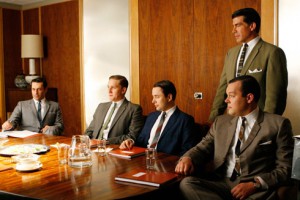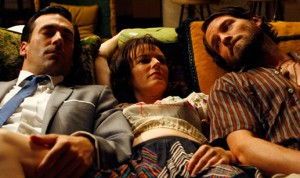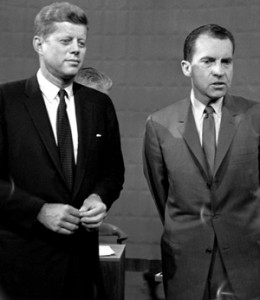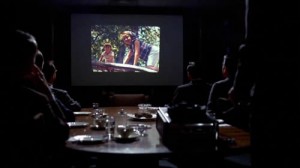DVD Rewatch: Mad Men – Season 1
“Round and a round, and back home again. To a place where we know we are loved.”
I gave Mad Men a run back when the first season came out on DVD in 2008, but the show and I weren’t connecting, and I didn’t feel compelled to at least finish the series, a rare occurrence for me. So my rewatch of Mad Men is technically just a rewatch of the first 6 episodes. Everything after episode 6, “Babylon,” was a never-before-watched, and thus brand new. (I kept the term “rewatch” just for the sake of organization.)
My decision to revisit Mad Men was motivated by a number of factors. First and foremost was simply that it had been on my list of things to watch for some time, and to stay at least somewhat up-to-date on “quality” television , and I opted for Mad Men over The Wire (off the air) and Breaking Bad (wrapping up its most recent season). Second was a desire to try and see why I didn’t like the show, despite the fact that it is incredibly well-made. Third was simply to get recaps on the blog in the lead up to the show’s fourth season (which Nick will review).
So, light up that unfiltered cigarette and have your secretary hold your calls.
I stopped with “Babylon” in 2008 because the show hadn’t given me a reason to care about these people. Instead of identification or empathy, I had, as Jason Mittell noted, a sense of distance and superiority about these characters. The ability to look at the story and sigh and roll my eyes at the sexism and racism the show engaged in: I was detached from it, but the show wasn’t.
This was a complicated position for me to be in: Mad Men is a show made in hindsight of the 1960s, deconstructing the images and perceptions of the era by ramping up the negative things to 11 and letting them play with only the barest tinge of irony (often provided by John Slattery’s Roger Sterling). As a result, I found myself frustrated by its depiction of and attitude toward women (Get the hell out that marriage, Betty! Start burning that bra, Peggy!) and men (Pete would never survive as a hunter! Don’s a cowardly jackass!).
The end result is a desire not for the show to be enjoyed or liked, but for it to be respected and admired.
But more than that, the show wanted me to acknowledge how “quality” it was: Characters have speeches! They have emotions, but they’re not playing out for everyone (including the audience) to see them! There’s hardly any music to underscore events! Prior to watching the show (both in ’08 and this month), I had no idea that creator Matthew Weiner had worked on The Sopranos, which explained everything. Sopranos was another show where I was told by everyone I needed to watch it, and I get through the first season and shrugged at the season finale. “Okay. So what?”
Like The Sopranos, Mad Men wanted me to acknowledge how good it was by creating a barrier between me and the show, by forcing me to adopt a critical distance instead of allowing me to adopt one while I became immersed in this fantastically detailed and fastidiously researched world. Indeed, this is often a problem I have most cable (premium and basic) shows: they want not to be broadcast so badly that they assume that character identification and likability are for “the masses”; characters you can’t relate to and don’t like are for “sophisticated” viewers. The end result is a desire not for the show to be enjoyed or liked, but for it to be respected and admired.
On my initial viewing, that Don changed his name/assumed someone else’s identity and had a long lost adopted brother in Adam (revealed in “5G”), pushed me out of the show. There was enough going on here with dealing with the 1960s that I didn’t need, or particularly want, Don to have a dark and secretive past (aren’t affairs, a semi-loveless marriage, and a mid-sized ad firm enough?). It was with considerably relief that Don doesn’t kill Adam. Had that occurred, I would have probably never returned the show. It would’ve been too much for me to tolerate, a quick out for what was going to be a character dead-end (though I think Adam’s suicide to be a very lazy way to introduce the capstone conflict between Don and Pete).
Had I continued in ’08, I would’ve probably finished the series after watching disc 3, which contains “Red in the Face,” “The Hobo Code,” and “Shoot.” The disc was not a turning point for me (I’ll get to that), however the shows reward my tried patience with glimmers of hope and one downer of an episode. First the downer. “The Hobo Code” has to be among the most singularly depressing hours of television ever. The episode, between Don’s encounters with the beatniks, Salvatore’s repression (a talking example of the show’s lack of irony: he’s TV-coded as gay from his first scene, but everyone is oblivious), and Peggy’s brief taste of success bummed me out from the claustrophobic feeling the show was pushing on me, only enhanced by the childhood Don flashbacks (which I contend are largely unnecessary).
But “Red in the Face” and “Shoot” make up for it. “Red in the Face” manages to make a vomiting scene (done in a wide shot no less, so we really get to see Roger vomit and the reactions from the other characters) both be funny and allow it to be funny (so little on this show is intended as funny). It’s a brilliant slice of revenge for Roger’s trespasses toward Betty, and while Don may not know exactly why he did it, that he did it is a great victory. But it’s really “Shoot” that rewarded me. Until this point, Betty has been more or less wallpaper. Sure, she’s got a storyline going on but it’s pretty drab and uninteresting. So when she lands a job modeling for Coca-Cola at an agency trying to court Don, it threatened the nicely compartmentalized world Don has set up for himself.
That Don sacrifices Betty’s potential new career to stay with Sterling Cooper is no surprise, and it hints that Don isn’t just in this for the money, that he likes the work family he has set up for himself at the firm. I never felt like his decision was intended as a strike against Betty’s desire to get out of the house, but remains a selfish act nonetheless. However, it’s how the episode bookends Betty that I responded to, that the show eeked out some response, albeit one from a critical distance. Anytime you see someone in a life they don’t want and they’re looking at birds, the symbolism is high school level obvious: Betty is trapped and she wants to be free, like those birds, stretching her wings even for a little bit.
And then, at the end of the episode, at 1:00 in the afternoon, still in her house robe/nightie, cigarette dangling from her mouth like she’s Bogart, Betty goes to her backyard and starts shooting the birds. The birds had, of course, threatened her own little space (specifically Polly the dog) by way of her neighbor who keeps the birds, but it was if Betty decided that the symbols were, for lack of a better phrase, pissing her off and that she didn’t need to be constantly reminded of her enclosed world. Instead, from that enclosed world, she shoots the birds. It’s a wonderfully rewarding, unexpected scene, that shows the potential depth that exists with Betty Draper (even though the follow-through on it felt minimal, it’s a good step), that I frankly didn’t expect the character capable of.
Disc 4, however, was a bit of an initial slog, losing what steam I had built up on disc 3. “Long Weekend” and “Indian Summer.” The two episodes together felt a bit weird, like they were intended as a thematic two-parter, and while watching “Long Weekend” I felt sure the two episodes aired together, and just ran one after each other, no credit break. I don’t have much to say about these episodes, in large part because the two episodes that follow it are just so much…better.
“Nixon vs. Kennedy” is a glorious bottle episode, and I say this as someone who adores bottle episodes (“17 People” from The West Wing being a model example, and now this one). The episode largely doesn’t live the offices of Sterling Cooper as all the office folks (do they have collective group name like House’s fellows are called Cottages or The Team?) ditch work and decide to watch the election results while having a party in the office (except for killjoy Peggy). In the other plot, Pete finally makes a last gambit for Don’s job (or just his respect) using the conveniently delivered photos Adam mailed Don prior to his suicide.
The episode is so painfully flawless that it kind of makes me sick. But this is the episode that broke down that barrier a little bit (“The Wheel” finished the job). Perhaps it was the fact that office characters have always been a group of people I wanted to know better, specifically Harry and Paul (my two favorites), and this episode delivers that much needed fix. The revelation of Paul and Joann having a past relationship was done so casually, but so effortless as well. Neither character has had much time together, so to have this reveal come out of nowhere and then be played without “SHOCK!” is just sublime. Harry drunken hook-up with a secretary is the kind of thing I never expected from his, but the morning after is exactly what I expected.
But it’s the final conflict between Pete and Don that perhaps generates the most heat. Pete’s development this season has very much been that of a man who wants to be villain, but has seen or read one too many plays, and doesn’t exactly know how to do it right. That he doesn’t finish his threat with “or else” just displays how inept (lazy?) a human being he is. But that Cooper simply doesn’t care that Don might’ve stolen someone identity is icing. Watching Pete just collapse inward as Cooper’s dismissal of the charge (with a historical perspective on it no less) is just great work from Vincent Kartheiser.
For most of the season, I was of the opinion that the flashbacks didn’t matter, and I contend that the childhood flashbacks essentially served as unnecessary window-dressing. I felt that Don telling his past to Rachel was more effective, since he’s clearly so vulnerable there, compared to the flashbacks. Yes, they kind of-sort of let us know what a miserable situation young Don was in, but as a way to convince me that Don would assume a dead man’s identity in Korea, they did not work.
But then there’s “The Wheel.” If “Nixon Vs. Kennedy” chipped through the barrier with a pick ax, “The Wheel” knocked down large sections of it with a sledge hammer. So, which scene did me in? Well, like Harry, I was undone by Don’s speech to the Kodak people, coupled with the pictures of his family. Don was undone by it as well, which made the scene all the more poignant.
I haven’t said anything about Don yet. It’s hard to talk about Don in complete way. Clearly he’s afraid of being abandoned again, and to avoid that abandonment, he keeps running away. But his travel with the Kodak carousel triggers all that he has been frittering away all season. It doesn’t matter how Don and Betty ended up at the point they’re at during the season, it just matters that they are. It matters that we see their happy times for the first time here, because the payoff for us is just as great as it is for Don: we didn’t know this, and he had forgotten this.
Indeed, all of Don’s actions have been leading up to this scene that spurs him to return to his family to go on vacation with them. So you can easily imagine my thrill (I’m sure those who have watched this already experienced something similar) when he comes into his house to find Betty and the kids almost ready to leave, but not gone yet. Yes! His marriage can be salvaged, he can be the husband we all believe him to be.
The cut gutted me.
It’s effective as a device since we’re elated to find Don going home to his family after his speech. But on the other hand, it’s painfully manipulative, an auteurist move to remind us that we’re watching deconstructive television, and that it can, and will, demolish us any time it feels like it: it tells us, like the scene tells Don, that complacency is the enemy of life. Like Don, we’ve brought into the notion that the family would always be there, because they’re always there, compartmentalized and safe. For them to break away wrecks us and him, and that’s why the scene is so emotionally satisfying (despite its manipulation).
Consider me hooked.
FINAL THOUGHTS
- I haven’t talked about characters, but I struggled to find a way to incorporate them in, since my concern was very much that barrier. I never found the characters off-putting, just deftly acted and written. Another aspect of the barrier to be sure, but one that was never a huge one for me.
- Knowing that there’s a time skip between seasons makes me nervous, but I’m willing to roll with it so long as the payoff is worth it.
- Jon Hamm is just like Cary Grant: Looks good in clothes. But then everyone looks great in this show. The cuts of the suits and dresses reek of 1960s Hollywood, and I ate it up.
- Anyone else think the twins in “Long Weekend” look like grown-up versions of the little girls from The Shining? Just me? Okay.
With season 2, I don’t think I’ll do a big wrap up like this, but instead do a disc by disc response, with disc 4 also being general response to the season (along the lines of this entry, but hopefully shorter).
- June 20, 2010
- Noel
- DVD Rewatch
- Mad Men, Season Recap





